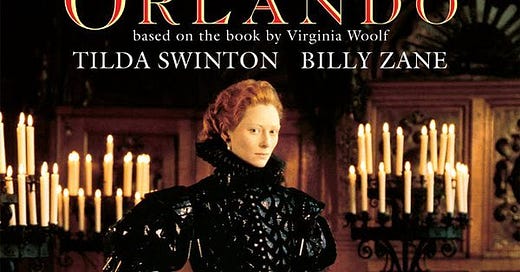"Orlando" makes me sweat
"Orlando, to me you were and always will be, whether male or female, the pink, the pearl, and the perfection of your sex."
Welcome to my movie diary!
This is my love letter to Orlando (1992), the cinematic tribute to Virginia Woolf’s fantastical biography.
I first watched Sally Potter’s Orlando during the pandemic-riddled summer of 2020, a year scarred by collective loneliness, grief, and death. I spent a few months in quasi-isolation recovering from a nasty case of COVID-19. During all that alone time I was forced to become reacquainted with my private self, stripping away the proverbial onion layers that made me feel safe, cocooned and unseen in the world. I decided to stop lying about being a woman. Announcing my gender fluidity allowed me to feel burly, brusque, ripe and deserving. The invisible ties that bound me for so long had disappeared. I was out of drag for the first time since beginning puberty. And my introduction to Orlando couldn’t have been timelier.
Orlando is about a genderfucking timelord whose story spans 300 years.
Woolf’s book has been famously described as “the longest and most charming love letter in literature.” Orlando is a poet who changes sexes, lives for centuries, and rejects the weariness of conformity, choosing in the end to inhabit a rich inner life. Sally Potter’s deft treatment of themes of gender, time, identity, societal constraints and creation/existence is masterful; the exquisite cinematography and expansive score breathes life and levity into a story that could easily be told too heavy-handedly.
You can get a taste of the score and the labyrinth scene pictured below here:
Tilda Swinton is transcendent as Orlando, embodying the cheeky inquisitiveness and fluidity that is so central to the role. In 2019 she revisited the story for Aperture, detailing what Orlando could serve to teach us today:
“I have come to value the landscape of this beloved book far less as being only about gender and far more as being about the profound flexibility of the fully awake and sensate spirit. I embrace its visionary perspective as an invaluable parable about true freedom—from the imperatives of nationality, of history, and of class, as well as of gender. A directive to the existence of an authentic and responsive soul: consistent and evolving, inviolable and pure.”
I look forward to reading Woolf’s classic, but in the meantime, I will always hold Sally Potter’s masterpiece close to my chest. As the credits rolled, I felt a flutter inside—for 90 minutes I was submerged in that rare state of timelessness, or rather, that I had experienced those 300 years.
Orlando invites us to stay awhile and explore the wilderness of Self. That’s where I’ll be.





